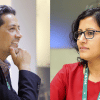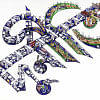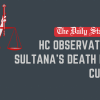The invisible face of accountability

If any of you are looking for an optimistic and uplifting piece, please move on . . . this column will be one of despair!
I grew up amongst people who lived simple lives, believed in certain precepts and made sacrifices for creating a better and fairer world. Alas, they have vanished like ether and have been replaced by users, boasters and shirkers, who pass the buck at every opportunity. Perhaps this is a universal phenomenon, but does that really matter to the ordinary folks in Bangladesh? They continue to struggle and face insurmountable challenges. The shining statistics about the nation's march toward a middle income country, the healthy foreign exchange reserves and the exponential growth of service sectors, hardly impact the daily grind and frustration experienced by the majority of the population. For, their basic rights are trampled upon at each step, their voices unheard and their aspirations dashed.
The malaise that seems to be affecting our society in multiple negative ways can be encapsulated in three poignant words: lack of accountability. Because people feel threatened by a system where honesty and admission of mistakes are penalised, they resort to mendacity, subterfuge and outright denial of responsibility! Permit me to reinforce my point with some concrete examples of poor accountability. . .
Many Dhaka city roads have been dug up to install new sewer lines. A necessary endeavour no doubt. However, the streets are blocked with gigantic pipes and idle machinery, creating major traffic snarls. What boggles the mind, however, is the lack of urgency in getting the work completed. There is no activity in sight. Why can't the contractors put forth extra effort and, like many other countries, also work night shifts causing minimum disruption? In a casual conversation with a bureaucrat, I was given a long-winded explanation: ". . . multiple Ministries are involved and a lot of coordination needed. It's not that easy etc." In summary, no one is responsible and there was no acknowledgement of the need for hasty action.
A second story relates to garbage management in Dhaka. The city corporation has created, in residential areas, temporary garbage dumping sites, euphemistically called "collection points". These open garbage heaps not only make the streets impassable, but also serve as veritable sources of spreading disease. Confronted with one such dump staring at me in front of my apartment, I plucked the courage to call the "responsible officer" in the corporation. His perfunctory response was: "Where else should we collect the garbage – whichever street we use, the residents complain." He added cynically, "Find me a suitable empty space." The problem was thrown back at me – a taxpayer. The corporation was made out to be the aggrieved party harassed by residents! Can it not, at least, place a dumpster to avoid garbage strewn on the street, posing a major health hazard?
Perhaps, the most heart-wrenching incident happened to a dear cousin. She was admitted to a well-established hospital for an endoscopy - a walk-in procedure. Shockingly, she passed away after the procedure, probably due to hemorrhaging caused by an internal rupture (incompetence or negligence?). But we were made to understand that it was a case of cardiac arrest (ultimately it was, since no one dies with the heart still beating). One can be philosophical about mortality and attribute it to destiny, but the interminable hurt and doubts keep arising from the "information black hole". Aren't the loved ones owed an explanation? Should there not be an investigation into the causes of fatality and someone held accountable? Isn't it important to draw lessons to avoid future negligence?
The sad truth is that right or wrong does not seem to matter anymore – the only thing that counts is what one will gain or lose. We live in a society where there is zero accountability, and seemingly infinite tolerance for violation of civil rights. No one owns up to his mistakes or learns from them. And why should they? When the editor of this newspaper, Mahfuz Anam, made an introspective statement about "independently unverified news" that was published during the 2007-8 caretaker government and admitted that it was an error in journalistic judgement, he was castigated, harassed and even charged with sedition. I will refrain from commenting on the specific cases filed against him since they are pending in the courts. But do we realise what this means in a society that is desperately in need of an infusion of moral "hormones"? It has given people who believe that only "losers" admit mistakes a great moment of triumph. And they are gloating.
We have allowed our moral compass to dip to its lowest point through our insouciance. We pretend to be unconcerned by a social calamity because we are personally not affected. But in fact, we are all culpable, to some degree, since we have failed to raise our voices. Let us admit: Each one of us is responsible for every crucial minute that is lost in mismanaged traffic, every epidemic that is spread because of unsanitary conditions created by inefficient garbage handling, every life that is lost due to medical malpractice and every innocent man who is harassed for assuming responsibility for his mistakes. We must not forget that we are all interconnected and exist in relation to each other. And it could be my child, my mother or my friend who is the next victim!
The writer is a renowned Rabindra Sangeet exponent and a former employee of the World Bank.

 For all latest news, follow The Daily Star's Google News channel.
For all latest news, follow The Daily Star's Google News channel. 








Comments